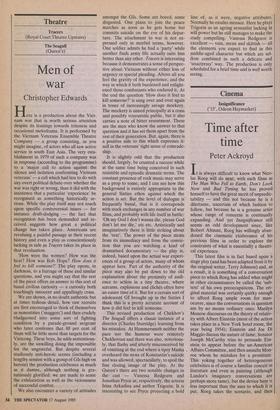Theatre
Tracers (Royal Court Theatre Upstairs) The Seagull (Queen's)
Men of war
Christopher Edwards
Here is a production about the Viet- nam war that is worth serious attention despite its leanings towards triteness and occasional melodrama. It is performed by the Vietnam Veterans Ensemble Theatre Company — a group consisting, as you might imagine, of actors who all saw active service in south East Asia. The very esta- blishment in 1979 of such a company was in response (according to the programme) to a 'major call to action against the silence and isolation confronting Vietnam veterans' — a call which had less to do with any overt political debate over whether the war was right or wrong, than it did with the insistence that a particular 'experience' be recognised as something historically se- rious. While the play itself may not touch upon specific controversial issues — for instance draft-dodging — the fact that recognition has been demanded and re- ceived suggests how great a political change has taken place. Americans are revaluing a painful passage in their recent history and even a play as conscientiously lacking in side as Tracers takes its place in that revaluation.
`How were the women? How was the heat? How was Bob Hope? How does it feel to kill someone?' The play opens, in darkness, to a barrage of these and similar questions, and you might say that the rest of the piece offers an answer to this sort of banal civilian curiosity — a curiosity both touchingly innocent and appallingly crass.
We are shown, in no doubt authentic but at times tedious detail, how raw recruits are first encouraged to think of themselves as nonentities (`maggots') and then crudely bludgeoned into some sort of fighting condition by a parade-ground sergeant who later confesses that 80 per cent of them will be little more than targets for the Vietcong. These boys, he adds sententious- ly, are the unwilling doing the impossible for the ungrateful. But despite several studiously anti-heroic scenes (including a lengthy session with a group of GIs high on heroin) the production celebrates as much as it damns, although nothing is gra- tuitiously glorified: we are made to sense the exhilaration as well as the viciousness of successful combat.
We also encounter a variety of attitudes amongst the GIs. Some are bored, some disgusted. One plans to join the peace marches as soon as he gets home but commits suicide on the eve of his depar- ture. The attachment to war is not ex- pressed only in morbid terms, however. One soldier admits he had a 'party' while another finds army life actually suits him better than any other. Tracers is interesting because it demonstrates a sense of perspec- tive about Vietnam without either loss of urgency or special pleading. Above all you feel the gravity of the experience, and the way in which it both burdened and enlight- ened those combatants who endured it. At the end the question 'How does it feel to kill someone?' is sung over and over again in tones of increasingly savage mockery. The mockery is aimed principally at a crass and possibly voyeuristic public, but it also carries a note of bitter resentment. These are the men who know the answer to that question and it has set them apart from the rest of their generation. But, again, there is a positive side to this which expresses it- self in the veterans' tight sense of comrade- ship.
It is slightly odd that the production should, largely, be counted a success while at the same time being conceived in such resistible and episodic dramatic terms. The constant presence of rock music may serve as a prop to some, and I can see how this background is entirely appropriate to the general Sixties ethos against which the action is set. But the level of dialogue is" frequently banal, that is it corresponds with stock exchanges in any number of war films, and probably with life itself in battle: `Oh my God I don't wanna die, please God don't let me die,' etc etc. Artistically and imaginatively there is little striking about the 'text'. The power of the piece stems from its immediacy and from the convic- tion that you are watching a kind of dramatised documentary — the play is, indeed, based upon the actual war experi- ences of a group of actors, many of whom appear here. Part of the authority of the piece may also be put down to the old explanation about the proximity of audi- ence to action in a tiny theatre, where screams, explosions and clichés often have an easier time of it. But for a certain sort of adolescent GI brought up in the Sixties I think this is a pretty accurate account of how it did feel to kill someone.
This revised production of Chekhov's The Seagull offers a classic instance of a director (Charles Sturridge) learning from his mistakes. At Hammersmith neither the pace nor the humour were remotely Chekhovian and there was also, notorious- ly, that flashy and utterly misconceived bit of vomiting at the end where a tipsy Masha overheard the news of Konstantin's suicide and was allowed, spectacularly, to spoil the fine closing image of the play. At the Queen's there are two notable changes in the cast — Vanessa Redgrave and Jonathan Pryce as, respectively, the actress Irina Arkadina and author Trigorin. It is interesting to see Pryce projecting a bold line of, as it were, negative attributes. Normally he exudes menace. Here he plays Trigorin as an ageing sensualist lacking in will power but he still manages to make the study compelling. Vanessa Redgrave is excellent — vain, mean and skittish — all the elements you expect to find in this middle-aged character but which are sel- dom combined in such a delicate and `unactressy' way. The production is only scheduled for a brief time and is well worth seeing.














































 Previous page
Previous page